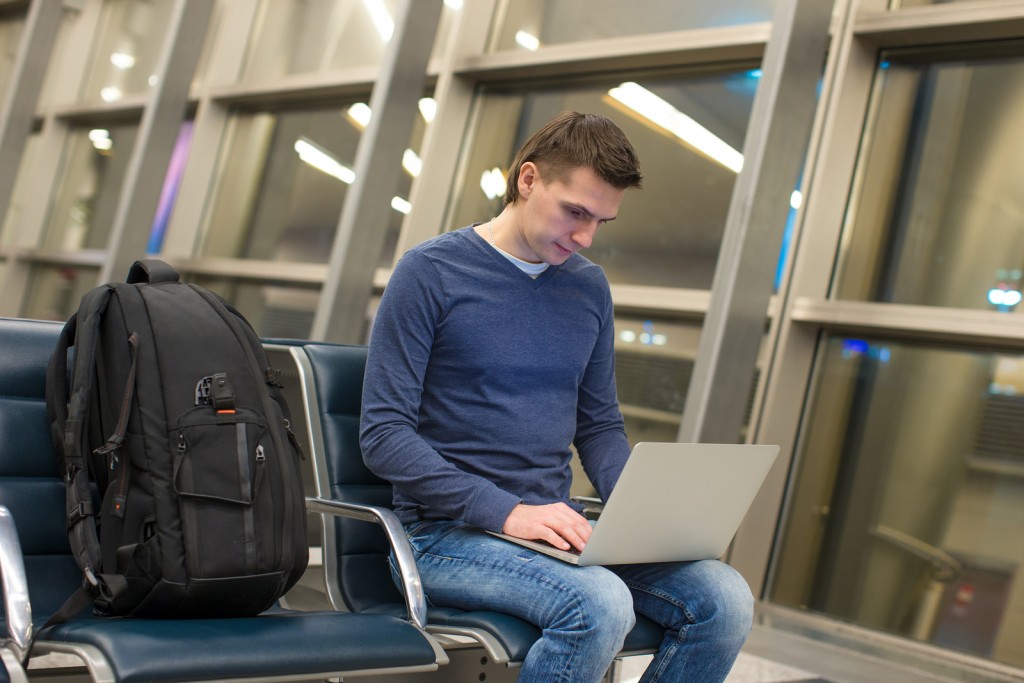A wifi hotspot is simply an area with an accessible wireless network. We’ve all seen them and many of us have probably used them. Most common in airports and coffee shops, internet on the go can be quite handy and keep you connected where ever you are. But beware. Using public wifi comes with cyber security risks and it is important to use wifi hotspot safety.
Evening knowing the risk, there is little doubt that most of us will continue to use wifi hotspots. After all, they are just too convenient and we’ve become a society that can’t tolerate not being connected. With that in mind, here are some suggestions to help keep your computer or other devices safe while hanging out at the coffee shop or waiting to catch your flight.

Use Security Software
Before you use any of your devices on a public wifi hotspot, be sure they have information security software. For your computer this means security packages that include both anti-virus and personal firewall capabilities. There are security packages designed specifically for smartphones and tablets. Make sure your device’s security software is up to date before connecting to public wifi.
Encryption is Key
Keeping your personal information secure online relies heavily on encryption. This scrambles the information you send over the internet into a code, making it inaccessible to others. When you’re using wireless networks, it’s best to send personal information only if it is encrypted. This can be accomplished by either using a secure wifi network or an encrypted website.
An encrypted website protects only the information you send to and from that site. A secure wireless network encrypts all the information you send using that network. Public wifi is typically not a secure network. A secure website will have “https” at the beginning of the web address. The “s” stands for secure.
Some websites use encryption only on the sign-in page, but if any part of your session isn’t encrypted, your entire account could be vulnerable. Look for “https” on every page you visit, not just when you sign in.
Are Mobile Apps Secure?
Mobile apps don’t have a visible indicator like “https”. Research has revealed that many mobile apps don’t encrypt information properly. This can make it a bad idea to perform any sensitive transactions like credit card shopping, banking, or anything transaction that contains sensitive personal information. If you must use a mobile device for this type of transaction, be sure use a secure wireless network or your phone’s data network.
Use a VPN
A VPN is a virtual private network. It extends a private network across a public network. This lets you send and receive data across shared or public networks as if you were directly connected to the private network. A VPN provides the functionality, security and management policies of the private network.
If you regularly access online accounts through wifi hotspots, it best to use a VPN. They encrypt traffic between your computer and the internet, even on unsecured networks. You can get a personal VPN account from a VPN service provider and VPN options are available for mobile devices. There many popular VPN services. Just Google and choose the one that best fits your needs.
Don’t Assume a Wifi Hotspot is Secure
Most wifi hotspots aren’t secure and don’t encrypt the information you send over the internet. If a network doesn’t require a WPA or WPA2 password, it’s probably not secure.
Using an unsecured network or one that doesn’t encrypt your information allows other users on the network can see what you see and what you send. Your session could be hijacked and your log in information obtained. A hacker can use this to gain access to other websites you use, including banking, credit card and other sensitive personal information.
Unfortunately, hacking information found online makes this easy, even for users with limited technical know-how.

Wifi Hotspot Safety Tips to Remember
Only visit encrypted websites. Be sure each page of the website is encrypted.
Look for “https” in the URL to know a site is secure.
Don’t stay permanently signed in to accounts. When you’ve finished using an account, log out.
Use different passwords on each website. This could prevent a hacker from accessing multiple accounts.
Pay attention to fraudulent websites or malicious download warnings. Keep your browser and security software up-to-date.
Keep control over when and where you use your mobile device. Change settings so it doesn’t automatically connect to nearby Wifi.
Use a VPN if you regularly use Wifi hotspots access online accounts.
Some public Wifi networks use encryption: WEP and WPA are common, but they might not protect you completely against hacking programs. WPA2 is the strongest.
No matter how careful you, you are never completely secure when using a Wi-Fi hotspot or public Wi-Fi. If your computer has be hacked, BayCCS may be able to help. While we cannot recover your stolen information, we can make sure security systems are up to date and remove any viruses or malware. We know you’re not going to stop surfing the internet while hanging out at the coffee shop or refraining from catching up on work while you’re waiting in the airport. Contact us to see how we can help.